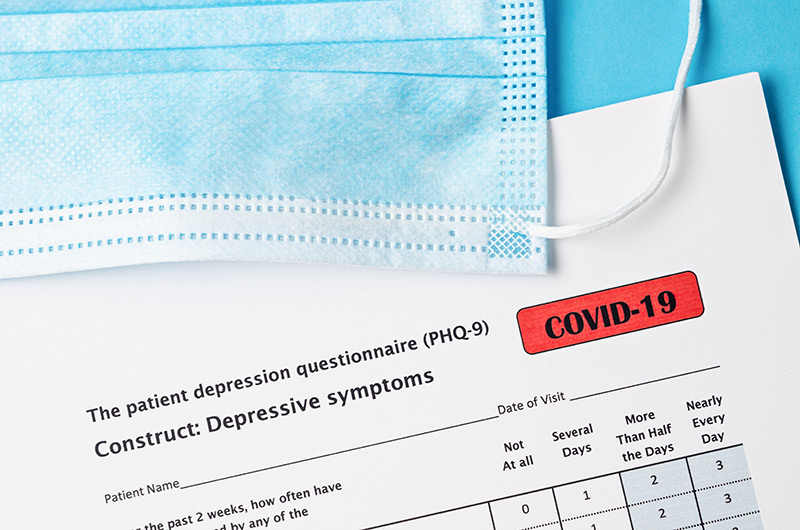The COVID-19 pandemic, armed conflicts, economic dislocations, and other concerns have affected mental health around the globe. Clinical depression, which affects 300 million individuals worldwide, is projected to increase.

With findings that are significant for both clinicians and patients, a large international study has shown that the most commonly used clinical measurement tool for depression, the PHQ-9, provides an easy-to-interpret single score of the physical and emotional symptoms that accurately indicates the presence (or lack of) and severity of the disorder, assisting in a diagnosis.
“You don’t treat hypertension or diabetes without measuring and monitoring a patient’s blood pressure with a blood pressure cuff or the hemoglobin the blood with an A1C test, said Kurt Kroenke, MD, a co-author of the new study, the developer of the PHQ-9 and a Regenstrief Institute Research Scientist and an Indiana University School of Medicine faculty member. “Similarly, with depression, you need to be able to measure and monitor the presence of both physical and emotional symptoms and their severity.

Kurt Kroenke, MD
“This study has shown that the free, easy-to-use PHQ-9, which can be administered in person, via telehealth or on a computer, provides a single, combined score of physical and emotional symptoms that is a good indicator of presence and severity of depression enabling both physicians and patients to track scores and respond appropriately.”
The study found the PHQ-9’s combined physical and emotion symptom score to be accurate regardless of sex, age, and language of translation. PHQ-9 scores are based on patient self-rating of physical and emotional symptoms over the past two weeks including low mood, fatigue, sleep problems, inability to concentrate, loss of appetite and lack of interest in one’s usual activities. The PHQ-9 employs a 4-point rating scale, from 0 for “not at all” to 3 for “nearly every day.”
“By determining that the PHQ-9’s single score of physical and emotional symptoms is a good indicator of presence and severity of depression, this study definitively shows that two scales, one for physical symptoms and one for emotional symptoms, with the ensuing need to somehow balance the two scores, are not necessary, making it easier evaluate and treat depression,” said Dr. Kroenke, a father of the growing field of symptomology.
The 58,272 study participants came from seven countries – the U.S., France, Germany, Israel, New Zealand, Spain and Switzerland — completed the PHQ-9 in English, Spanish, French, German or Hebrew.
“Is the PHQ-9 a Unidimensional Measure of Depression? A 58,272-Participant Study” is published in the peer reviewed journal Psychological Assessment, a publication of the American Psychological Association. Co-authors, in addition to Dr. Kroenke, are Renzo Bianchi, PhD, of University of Neuchâtel, Switzerland (corresponding author); Jay Verkuilen, PhD, of City University of New York (U.S.); Sharon Toker, PhD, of Tel Aviv University (Israel); Irvin Sam Schonfeld, PhD, MPH, of City University of New York (U.S.); Markus Gerber, PhD, of University of Basel (Switzerland); and Elmar Brähler, PhD, University of Leipzig (Germany).
About Kurt Kroenke, MD
In addition to his role as a research scientist at Regenstrief Institute, Kurt Kroenke, MD, is also director of the Master of Science in Clinical Research program and a professor of medicine at Indiana University School of Medicine.
About Regenstrief Institute
Founded in 1969 in Indianapolis, the Regenstrief Institute is a local, national, and global leader dedicated to a world where better information empowers people to end disease and realize true health. A key research partner to Indiana University, Regenstrief and its research scientists are responsible for a growing number of major healthcare innovations and studies. Examples range from the development of global health information technology standards that enable the use and interoperability of electronic health records to improving patient-physician communications, to creating models of care that inform practice and improve the lives of patients around the globe.
Sam Regenstrief, a nationally successful entrepreneur from Connersville, Indiana, founded the institute with the goal of making healthcare more efficient and accessible for everyone. His vision continues to guide the institute’s research mission.
About IU School of Medicine
IU School of Medicine is the largest medical school in the U.S. and is annually ranked among the top medical schools in the nation by U.S. News & World Report. The school offers high-quality medical education, access to leading medical research and rich campus life in nine Indiana cities, including rural and urban locations consistently recognized for livability. For more information visit www.regenstrief.org.



